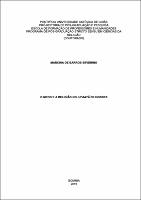| Compartilhamento |


|
Use este identificador para citar ou linkar para este item:
http://tede2.pucgoias.edu.br:8080/handle/tede/4137Registro completo de metadados
| Campo DC | Valor | Idioma |
|---|---|---|
| dc.creator | Severino, Marcina de Barros | - |
| dc.creator.Lattes | http://lattes.cnpq.br/3955616415247767 | eng |
| dc.contributor.advisor1 | Marinho, Thais Alves | - |
| dc.contributor.advisor1Lattes | http://lattes.cnpq.br/9094700593263241 | eng |
| dc.contributor.referee1 | Ecco, Clóvis | - |
| dc.contributor.referee1Lattes | http://lattes.cnpq.br/4282485443095712 | eng |
| dc.contributor.referee2 | Oliveira, Irene Dias de | - |
| dc.contributor.referee2Lattes | http://lattes.cnpq.br/5592965474559311 | eng |
| dc.contributor.referee3 | Souza, Dalva Maria Borges de Lima Dias de | - |
| dc.contributor.referee3Lattes | http://lattes.cnpq.br/5291000127026087 | eng |
| dc.contributor.referee4 | Carvalho, Diego Avelino de Moraes | - |
| dc.contributor.referee4Lattes | http://lattes.cnpq.br/2515993225919961 | eng |
| dc.date.accessioned | 2019-03-25T12:02:37Z | - |
| dc.date.issued | 2019-02-15 | - |
| dc.identifier.citation | Severino, Marcina de Barros. O MEDO E A RELIGIÃO NO LEVIATÃ DE HOBBES. 2019. 103 f. Tese (Programa de Pós-Graduação STRICTO SENSU em Ciências da Religião) - Pontifícia Universidade Católica de Goiás, Goiânia-GO. | eng |
| dc.identifier.uri | http://tede2.pucgoias.edu.br:8080/handle/tede/4137 | - |
| dc.description.resumo | Esta tese, desenvolvida na Pontifícia Universidade Católica de Goiás, no âmbito do Programa de Pós-Graduação Stricto Sensu em Ciências da Religião, nível doutorado, integra a área de concentração Religião, Cultura e Sociedade, e faz parte da linha de pesquisa Cultura e Sistemas Simbólicos. Investiguei em que medida a teoria do Estado hobbesiano presente na obra Leviatã se constituiu a partir de valores religiosos da época. O medo de Hobbes se subordina à cultura e ao imaginário de seu tempo, pois são estruturas que fazem parte da constituição identitária dos indivíduos. A religião conferiu à teoria do Estado hobbesiano, presente no Leviatã, uma ideia de que o poder divino imperava sobre o processo de organização humana nesse mundo, por isso, o medo que impulsionou o ser humano à transferência de poder ao Estado não é apenas o medo hobbesiano da morte violenta, mas também o medo presente nas dimensões religiosas e culturais que estavam inseridas nas visões de mundo de Hobbes e da sociedade de seu tempo. Amparada na hermenêutica, utilizo da técnica da pesquisa bibliográfica e da análise do discurso. As principais fontes são: a documentação escrita encontrada na obra de Hobbes Leviatã e de estudiosos que analisam a relação entre religião e Estado com base nessa obra. Concluí que, apesar da presença constante da religião na época de Hobbes, ele em seu texto, condena a atitude de líderes religiosos que usam o nome de Deus para obter benefícios, mas ele próprio não conseguiu se abster da religião. | eng |
| dc.description.abstract | This thesis, developed at the Pontifical Catholic University of Goiás, scoped of the Stricto Sensu Post-Graduation Program in Religious Sciences, level doctorate, integrates the area of concentration Religion, Culture, and Society, and is part of the research line Culture and Symbolic Systems. It investigates to what extent the Hobbesian State theory in the Leviathan, comes from the religious values of that time. The fear of Hobbes is the fruit of the culture and the imaginary of his time because they are structures that are part of the identity of those people. The Religion in the theory of the Hobbesian State, present in Leviathan, conferred an idea that the divine power rules over the process of human organization in this world, for the fear that impelled the human being to transfer power to the State is not only the Hobbesian fear of violent death, but also the fear of the religious and cultural dimensions that were embedded in the worldviews of Hobbes and the society of his time. It is supported by the hermeneutics, using the technique of bibliographic research and analysis of speech. The main sources are the written documentation found in the work Hobbes Leviathan and scholars who analyze the relationship between religion and State based on this work. It is concluded that, despite the constant presence of religion in the time of Hobbes, he, in his text, condemns the attitude of religious leaders who use the name of God to gain benefits, but he himself could not abstain from religion. | eng |
| dc.description.provenance | Submitted by admin tede ([email protected]) on 2019-03-25T12:02:37Z No. of bitstreams: 1 MARCINA DE BARROS SEVERINO.pdf: 789212 bytes, checksum: 8e8d8499220b556ef960cea41192d48f (MD5) | eng |
| dc.description.provenance | Made available in DSpace on 2019-03-25T12:02:37Z (GMT). No. of bitstreams: 1 MARCINA DE BARROS SEVERINO.pdf: 789212 bytes, checksum: 8e8d8499220b556ef960cea41192d48f (MD5) Previous issue date: 2019-02-15 | eng |
| dc.format | application/pdf | * |
| dc.thumbnail.url | http://tede2.pucgoias.edu.br:8080/retrieve/12983/MARCINA%20DE%20BARROS%20SEVERINO.pdf.jpg | * |
| dc.language | por | eng |
| dc.publisher | Pontifícia Universidade Católica de Goiás | eng |
| dc.publisher.department | Escola de Formação de Professores e Humanidade::Curso de Teologia | eng |
| dc.publisher.country | Brasil | eng |
| dc.publisher.initials | PUC Goiás | eng |
| dc.publisher.program | Programa de Pós-Graduação STRICTO SENSU em Ciências da Religião | eng |
| dc.rights | Acesso Aberto | |
| dc.subject | Hobbes. Leviatã. Religião. | por |
| dc.subject | Hobbes. Leviathan. Religion. | eng |
| dc.subject.cnpq | CIENCIAS HUMANAS::TEOLOGIA | eng |
| dc.title | O MEDO E A RELIGIÃO NO LEVIATÃ DE HOBBES | eng |
| dc.title.alternative | Fear and Religion in the Leviathan of Hobbes. | eng |
| dc.type | Tese | eng |
| Aparece nas coleções: | Doutorado em Ciências da Religião | |
Arquivos associados a este item:
| Arquivo | Descrição | Tamanho | Formato | |
|---|---|---|---|---|
| MARCINA DE BARROS SEVERINO.pdf | Texto Completo | 770,71 kB | Adobe PDF |  Baixar/Abrir Pré-Visualizar |
Os itens no repositório estão protegidos por copyright, com todos os direitos reservados, salvo quando é indicado o contrário.




